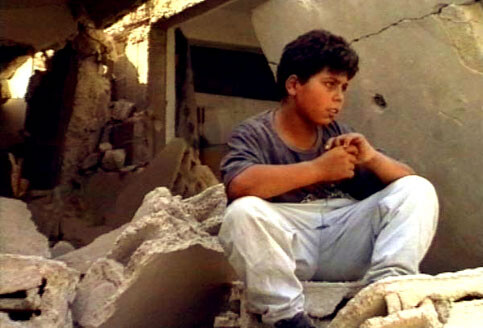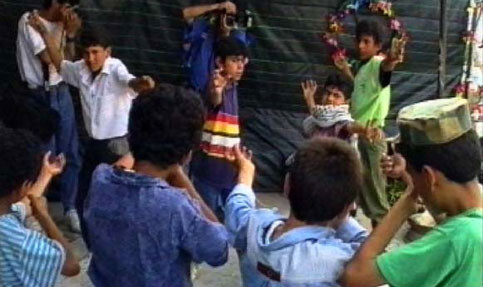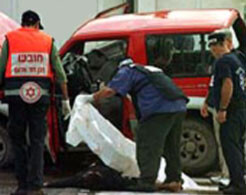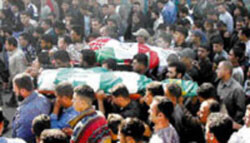The Electronic Intifada 11 December 2003

Ala sitting on the ruins of his home blown up by Israeli occupation forces growing up to become a fighter, leading the Aqsa Brigades in Jenin.
Speechless. Silent. I could not move. I just sat there, watching the screen, the scrolling text of dedication and the names of Arna’s children: Youssef, Nidal, Ashraf, Ala, Zakaria and the others. Arna’s children form a small theatre group of Palestinian children in Jenin refugee camp.
The film begins with a shot of Arna, Juliano Mer’s mother. She is bald, due to cancer, covered with a kaffiyeh, and is screaming at
Palestinian cars that they can pass through a nearby Israeli military roadblock. Arna Mer comes from a Zionist family. In 1948 she served in the Palmach. She became a member of the Communist Party and married Saliba Khamis, a Palestinian from Nazareth. During the previous Intifada, Arna moves to Jenin and established an alternative education system for Palestinian children, after the schools were closed by the Israeli occupation.

Arna’s children, they dance, play, act and laugh.
Through her dedication to the children, Arna Mer Khamis plays an important role in the Jenin community. The theatre group that she started engaged children from Jenin refugee camp, helping them to express their everyday frustrations, anger, bitterness and fear.
Arna’s son Juliano, director of this film, was also one of the directors of Jenin’s theatre. All those years, from 1989 to 1996, Juliano used his camera to film the rehearsals and performances of the plays. Arna Mer Khamis was awarded for her work with the Right Livelihood Award, an alternative Nobel Prize from the Swedish parliament. With the $50,000 award she set up a small theater in the refugee camp.
The film shows the Nidal, the youngest, his brother Youssef and their best friend Ashraf, “the shorty with the big smile.” We see them playing, acting and laughing. We also meet their friend and neighbour Ala. He is 9 years old and sits on a pile of rubble. He witnessed the destruction of his home. Israeli soldiers blew up the building, causing the collapse of the home of their neighbours. Both Ashraf and Ala witnessed the destruction of their respective homes. Through playing and acting they try to cope with their memories of the refugee camp and daily reality.
Later Juliano went back to Jenin. First with his mother, who suffered from cancer and who wanted to pay a last visit to the camp. After his mother died and years after the theatre has closed, Juliano looks up ‘Arna’s children’. This time it was a few days after the Israeli army invaded Jenin on April 3, 2002, killed more than 50 Palestinians and destroyed hundreds of homes.

Israeli security officer covers the bodies of Youssef Sweitat and Nidal al-Jabali after they were shot and killed during their attack in Hadera (File photo: Reuters)
We hear that Youssef witnessed the killing of Reham. She was hiding with fellow-pupils in a classroom when Israeli tanks shelled the Ibrahimiya Elementary School in Jenin. She was hit. Youssef was the only one who went inside the school and carried her outside. In his arms on the way to the hospital, 10-year-old Reham died.
Juliano also learned that Ashraf was shot and killed during the battle in Jenin in April 2002. He was leading a group of resistance in the refugee camp. Ala had become a leader of the Aqsa Brigades. Zakaria, who also was playing with the theater group, also joined the resistance group, Ala was leading. Ala was with Ashraf before he was shot and killed.
Arna’s son, Juliano, who today is one of the leading actors in the region, looks back in time in Jenin, trying to understand the choices made by the children he loved and worked with. Eight years ago, the theatre was closed and life became static and paralysed. Moving back and forth between various periods of uprising and the various ages of Arna’s children, we see the kids performing, which image turns into the picture of the same boy holding a M16 on a poster announcing his martyrdom.

The funeral of Ala Sabagh, leader of the Aqsa Brigades in Jenin and Immad Nasharti, leader of the armed wing of Hamas in Jenin. Both were killed in an explosion on November 26, 2002 (File photo: Al-Jazeera.net)
Related Links:




